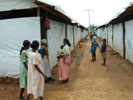
Midnight Sunday marked the beginning of the Sri Lankan New Year as well as the start of a two-day cease fire mandated by the Sri Lankan government. Sources say that the government has driven the Tigers into the tiny area determined to be a civilian “safe zone,” but is allowing two days — during which time Sri Lankan army has been told not to fire unless fired upon — for civilians to flee the 7.7 square mile swath of coast in which an estimated 100,000 people remain trapped. Pro-Tiger sources referred to the cease fire as an “insult,” that constituted “the imprisonment of civilians by the state.”
Secretary General Ban ki Moon and British Foreign Minister David Milliband called the ceasefire a useful first step, but U.N. humanitarian chief John Holmes advocated for a more robust cessation of violence, telling the BBC, “We would have liked a longer pause than this, a genuine humanitarian pause of a longer period than two days.” Earlier this morning, the Tigers stated their desire to negotiate a longer term cease fire with the government, which they noted should include "a base for political negotiations." However, the government rebuffed their overture, noting that the Tigers must first "demonstrate any genuine goodwill on its part in allowing the civilians to have free movement."
A day into the ceasefire, woefully few civilians have left the protected area. Reports note that only 18 people escaped out of the civilian zone Monday. Because journalists and observers are not allowed in the conflict area, there is no way of knowing what exactly is going on, but the government and the Tigers have traded blame for violations of the ceasefire. Such continued violence is one possible reason people are not leaving, but the government has also voiced the concern that the Tigers are forcing civilians in the region to stay and act as human shields. Although the government calls have the slight ring of propaganda, the Tamil Tigers have been known to purposefully embed themselves in civilian populations in the past, so that scenario isn’t too far-fetched.
In a statement late last week, Human Rights Watch — which has called the region one of the most dangerous in the world and has made several pleas for civilian protection — castigated both sides of the conflict and called on the Security Council to discuss the issue. So far, the Security Council hasn’t formally addressed the problem. Reports note that while members have been briefed, it seems that China is stalling the implementation of a formal discussion.

